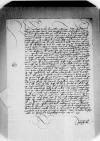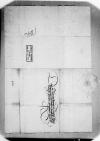Wat tzvisßenn(n) Iwr Ersamheit un(n)d mir vor enem jare gehandelt, / ist, / als ik hape / in frischem gedechtniß, dar inne ik my und myne ere / nha mynem besten vorwaret hebbe mynem Gdańsk (Danzig, Dantiscum), city in northern Poland, on the Bay of Gdańsk at the mouth of the Vistula, on the Baltic, the biggest and wealthiest of the three Great Prussian Cities (Gdańsk, Thorn (Toruń), and Elbing (Elbląg)) with representation in the Council of Royal Prussia; a member of the Hanseatic League⌊vaderlikenn lande(n)Gdańsk (Danzig, Dantiscum), city in northern Poland, on the Bay of Gdańsk at the mouth of the Vistula, on the Baltic, the biggest and wealthiest of the three Great Prussian Cities (Gdańsk, Thorn (Toruń), and Elbing (Elbląg)) with representation in the Council of Royal Prussia; a member of the Hanseatic League⌋, / ßo ik plichtig, / billich ßolde(n), / un(n)d myne(m) gelöffnisße nicht entkegenn(n) gewest, / eth were denne im denste myt schrifftenn(n), / dat ik nicht vorhabenn(n) holde, / wor inne, / wo witlig ik schuldich tho donn(n) bin, / wat my van den, de my tho gebod(en), macht hebbenn(n) gehetenn(n) wart. / Dar mede ik kegenn(n) iderm(m)eniglich entschuldiget / vornu(n)ftigenn(n) lüden und unvordechtlig bin, / is mir der sint vorkamen, / ik wedder Iwe Ers(amkei)t / und bsunder de Gdańsk town court ⌊h(e)rnn scheppennGdańsk town court ⌋ / vor Sigismund I Jagiellon (Zygmunt I) (*1467 – †1548), King of Poland and Grand Duke of Lithuania (1506-1548); Duke of Głogów (Glogau) (1499-1506), Duke of Opava (1501-1506), Governor of Silesia (1504-1506); son of King Kazimierz IV Jagiellon and Elisabeth of Austria⌊ko(nigliche)r m(aieste)tSigismund I Jagiellon (Zygmunt I) (*1467 – †1548), King of Poland and Grand Duke of Lithuania (1506-1548); Duke of Głogów (Glogau) (1499-1506), Duke of Opava (1501-1506), Governor of Silesia (1504-1506); son of King Kazimierz IV Jagiellon and Elisabeth of Austria⌋, mynem allerg(nedigs)t(e)n h(e)rnn, / sulde vele, / dat wedder ere und gelimpe Iw(e)r Ers(amkei)t / were vorluthbart hebbenn(n), / dat, / als ik hape, / Iw(e)r E(rsamkeit) secretarius, Ambrosius Storm (Ambroży Storm), envoy of the Gdańsk Town Council to Sigismund I Jagiellon to Piotrków 1523-11-16 to 1523-12-18⌊m(a)g(iste)r AmbrosiusAmbrosius Storm (Ambroży Storm), envoy of the Gdańsk Town Council to Sigismund I Jagiellon to Piotrków 1523-11-16 to 1523-12-18⌋, de myt velen(n) trefflikenn(n) h(e)rnn kegenwerdich gewest, / nicht nha seggenn(n) wart. / Wat ik dar gesecht hebbe, hefft / disse menu(n)ghe, / ik hebbe vorbrocht, dat de Gdańsk town court ⌊h(e)rnn scheppenn(n)Gdańsk town court ⌋ / in der sakenn(n), de mir vann(n) myner frundinne vogedregen is, / nicht en recht ordel gefunden(n) hebbenn(n), / dat my nicht steit tho vorkerenn(n). / Heddet my un(n)d mynem parte recht geducht, / were nicht van nödenn(n) gewest, an Iwe E(rsamkeit) tho appellirenn(n), / dat sik dar nha finden wart. Und dat ik Sigismund I Jagiellon (Zygmunt I) (*1467 – †1548), King of Poland and Grand Duke of Lithuania (1506-1548); Duke of Głogów (Glogau) (1499-1506), Duke of Opava (1501-1506), Governor of Silesia (1504-1506); son of King Kazimierz IV Jagiellon and Elisabeth of Austria⌊ko(niglich)e m(aieste)tSigismund I Jagiellon (Zygmunt I) (*1467 – †1548), King of Poland and Grand Duke of Lithuania (1506-1548); Duke of Głogów (Glogau) (1499-1506), Duke of Opava (1501-1506), Governor of Silesia (1504-1506); son of King Kazimierz IV Jagiellon and Elisabeth of Austria⌋ gebedenn(n) hebbe um(m)b enenn(n) fryenn(n) berop van iw tho syner m(aieste)t, / szo ik my in iwem utsprake bsueret folde, / is der halwen de kon(n)igk kegenn(n) mir superinscribed⌈mirmir superinscribed⌉ myt thorne nicht beweget worden(n). Ok hape ik, dat eth Iwer E(rsamkeit) szo szulkent van rechte gebörth, / nicht tho nha is. / Szo hefft sik all de handel, den ik Sigismund I Jagiellon (Zygmunt I) (*1467 – †1548), King of Poland and Grand Duke of Lithuania (1506-1548); Duke of Głogów (Glogau) (1499-1506), Duke of Opava (1501-1506), Governor of Silesia (1504-1506); son of King Kazimierz IV Jagiellon and Elisabeth of Austria⌊ko(nigliche)r m(aieste)tSigismund I Jagiellon (Zygmunt I) (*1467 – †1548), King of Poland and Grand Duke of Lithuania (1506-1548); Duke of Głogów (Glogau) (1499-1506), Duke of Opava (1501-1506), Governor of Silesia (1504-1506); son of King Kazimierz IV Jagiellon and Elisabeth of Austria⌋ in kegenwerdicheit Iwer E(rsamkeit) gedocht(e)n, secretarii mynes goden(n) frundes, vörgebrocht helbe, / do ok anders nicht seggenn(n) wart. / Darumb is myne fruntlike bede, my vör enen nicht woldet hold(en), de uff ere, / trwe / und redligheit nicht gedöchte, / dar inne ik hapt kegen Iwe E(rsamkeit) und enem idrenn(n) myn leven tho vorbringenn / und hape Iwe E(rsamkeit) dar mede my gonstiger un(n)d fru(n)tliker tho makenn(n). / Dissenn(n) und andren handel mhe(e)r / wil ik im kortenn(n) withlopiger, / szo ik vann(n) myne(m) all(er)g(nedigs)ten(n) h(e)rnn Sigismund I Jagiellon (Zygmunt I) (*1467 – †1548), King of Poland and Grand Duke of Lithuania (1506-1548); Duke of Głogów (Glogau) (1499-1506), Duke of Opava (1501-1506), Governor of Silesia (1504-1506); son of King Kazimierz IV Jagiellon and Elisabeth of Austria⌊konigeSigismund I Jagiellon (Zygmunt I) (*1467 – †1548), King of Poland and Grand Duke of Lithuania (1506-1548); Duke of Głogów (Glogau) (1499-1506), Duke of Opava (1501-1506), Governor of Silesia (1504-1506); son of King Kazimierz IV Jagiellon and Elisabeth of Austria⌋ affkamenn(n) kan, / vorklarenn(n) / und my kegenn(n) Iwe E(rsamkeit), als enem rechtenn(n) danczker kinde angehort, fru(n)tlikenn(n) holdenn(n), / welke Goth de almechtige in glugszeligheit wolfart und langer gesuntheit behöde.
 APG 300, D5, No. 732 p. 2 unnumbered
APG 300, D5, No. 732 p. 2 unnumbered  APG 300, D5, No. 732 p. 1 unnumbered
APG 300, D5, No. 732 p. 1 unnumbered 
